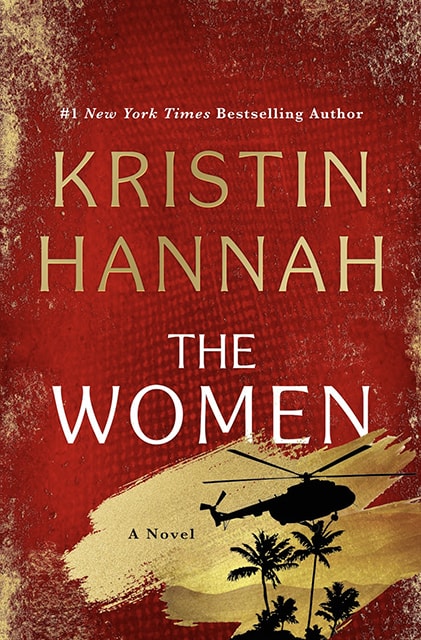
ORDER THE BOOK
HARDCOVER
Amazon
Barnes & Noble
Bookshop
Books-a-Million
E-BOOK
Apple Books
eBooks.com
Google Play
Kindle
Kobo
Nook
AUDIOBOOK
The Women
Author Q & A
Q. What inspired you to write a novel set during the turbulent era of the Vietnam War?
A. The Vietnam War cast a big shadow over my childhood. I remember the turbulence of the era, the unrest. When I was in elementary school, my best friend’s father was MIA; he’d been shot down in 1967. I remember wearing his POW bracelet for decades. As a result, his name was burned into my memory. Because of him, I remember vividly the sense of waiting for the warriors to come home, and I remember how they were treated upon return. Even as a young girl, I knew how wrong it was. These feelings have stayed with me for years, and I have wanted to write about this pivotal moment in American history. I am so grateful to be able to shine a light on the veterans who were forgotten for too long.
Q. The country is currently polarized politically and socially with an intensity not seen or felt since the 1960s. Did today’s extreme divisions between people influence your novel?
A. Absolutely. I first pitched this novel in the late 1990s and ended up deciding that I wasn’t ready to dig into this era. I think I needed to be older, hopefully wiser, and absolutely certain of what I had to say. And then came the pandemic. In the midst of the lockdown, with all of the attendant fear and division in America and abroad, I realized that it was the perfect moment to delve into another terrible, politically divided time in our country. One of the things I love about historical fiction is its ability to illuminate the modern world. Now, more than ever, we need to find a way to come together and have civil, informed conversations.
Q. Did your research for this novel include reading any memoirs or histories about the nurses who served in Vietnam? What about in-person interviews or conversations?
A. Obviously, the research for this novel was extensive and, honestly, a little daunting. In choosing to write about one nurse’s experiences, I was able to pare down the enormity of the subject as well as make it deeply personal. Yes, I was lucky to talk to many Vietnam-era veterans of the war—nurses, Red Cross workers, and even a decorated helicopter pilot. All of them helped me to create and maintain a truthful, accurate feel for my fictional story. But more than that, these veterans inspired me. I learned about their wartime experiences and their troubles coming home, about how it felt to be a veteran of this unpopular war. I was recently able to attend the Veteran’s Day commemoration in Washington, D.C., and it was an awe-inspiring, heart-expanding, heartbreaking experience. I stood at the Women’s Vietnam Memorial with Diane Carlson Evans and heard her speak of the ten-year struggle she waged to get the Memorial built and placed near The Wall (The Vietnam Veterans Memorial). I watched as dozens of these nurses– gathered at their own memorial– hugged each other and laughed and cried together.
Q. Frankie experiences loss, heartbreak, combat, trauma, and addiction in her personal journey. Over the course of her story, what were the most difficult moments and emotions to depict?
A. You’ll probably be surprised to hear that the most difficult aspects of this story for me, as the writer, centered on the love story. At her core, Frankie was a patriot and an idealist. I always knew that. And I loved that about her. So, when she broke her own moral code for love, I had a lot of trouble following that path, making her walk it. I think, in the end, it really made her fallible and human and revealed the depth of her pain, but readers may feel differently about her choice and why she made it.
Q. Frankie’s friendship with Barb and Ethel was a profound source of strength and courage. Comment about the ways in which women’s friendship plays a role in this novel and in your own life.
A. I think female friendship is one of the most powerful forces on earth. When we women come together in love and friendship, we are unbreakable. That was the silver lining of Frankie’s wartime experience: she met the best friends of her life, women that would be at her side come hell or high water. I am fortunate to have a group of girlfriends that keep me steady and upright. We laugh, we cry, we rail, we argue, but mostly, we share our lives. I can’t imagine my life without them.
Q. Throughout the COVID-19 pandemic, nurses were on the frontlines facing life and death. They have been called heroes, and yet their physical, mental, and emotional exhaustion under the circumstances has not been thoroughly explored in popular culture. Are the parallels we can find in The Women between these nurses and the nurses who served in Vietnam deliberate?
A. Absolutely. You can see that I mention medical workers in my dedication for The Women. I researched and wrote this novel during the pandemic, and every day on the news I was seeing the price our medical professionals were paying. They were exhausted and overworked and underappreciated. This novel gave me a chance to say thank you to them for their service, too.
Q. What themes, elements, relationships, settings, or time periods are piquing your interest for your next novel?
A. Ha! I wish I knew. The Women was such a labor of absolute love. I adored writing about these amazing, resilient women—military and civilian—and illuminating both their service in Vietnam and the struggle they faced upon coming home. It will be a tall order to find another story with a similar amount of power and importance, but I’m looking!
